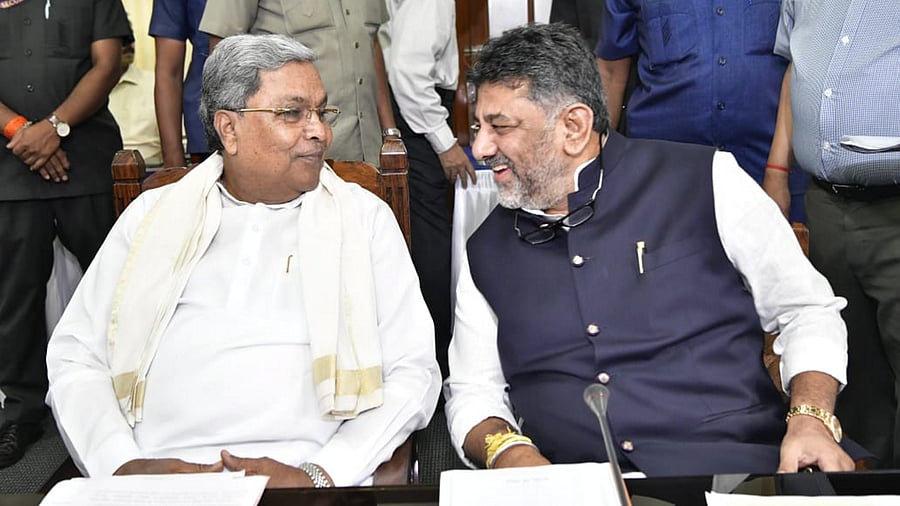
Karnataka Chief Minister Siddaramaiah and Deputy Chief Minister DK Shivakumar.
Credit: PTI Photo
For a government that came to power with a popular mandate and raised hopes of delivering democratic and efficient governance, the two-year record of the Congress in Karnataka is marked by contradictions. While sustaining the five guarantees may be a feather in its cap, the government’s failure to fulfil many of the promises made in its election manifesto and its dithering on several key issues cast a shadow on its performance.
The blitz of advertisements proclaims people-centred governance, but the government’s reluctance to address land rights—especially its inability to withdraw the Land Reforms (Amendment) Act of 2020 — reveals its alignment with the neoliberalisation of land and agriculture. Despite a prolonged protest by people in the Devanahalli area against the imposition of the Land Acquisition Act, in which people from 13 villages stand to lose not only 1,777 acres of fertile land but also their livelihoods and life-worlds, the government has reneged on its promises to resolve this impasse.
Far from ensuring livelihood security and ecological sustainability, the Congress regime has enabled the opening up of mining licences without adequate regulatory mechanisms. No climate change action plan has been forthcoming. Asserting that mega construction works such as in Mekedatu, Yethinahole, the Bengaluru-Mangaluru highway, and the ports in Uttara Kannada are sites of great development indicates the government’s total disregard for urgent issues of ecological sustainability. That the factories of Koppal can spew out toxic fumes and are not regulated or made responsible for the ill health and rampant destruction unleashed by them is a telling indication that the government is concerned neither with the well-being of people nor with providing effective governance.
Boasting about its ability to attract investments, the government seems convinced that big infrastructure is the answer to Bengaluru’s urban crisis. But the city continues to suffer from poor urban planning, indifferent administration, and an unregulated real estate sector. And elected leaders continue to bungle. Undemocratic decisions — such as the establishment of the Greater Bangalore Authority or the proposal to integrate Ramanagara district into Bengaluru — have been made without public or professional deliberations and consultations.
What ‘Brand Bangalore’ can signify or become over the years is not considered even as the imposition of the twelve-hour work norm has not been reviewed or withdrawn.
Just as its advertisements claim to be pro-people, the Congress government proclaims and celebrates the Constitution as the guiding light of India’s political and social systems. Promoted through programmes and events in schools, colleges and even public places, the spirit and morality of the Constitution could have been this government’s guiding principles. Instead, on several fronts, it has failed to sustain the key morality of the Constitution. Its refusal to permit people to gather in public places to protest, suppression of protests (including those against issues such as Israel’s war on Palestine), and crackdowns on protestors—by extension on dissent—make the Congress no different from the previous BJP regime, which sought to curb a range of freedoms that are assured by the Constitution.
Why has the government not repealed the anti-cow slaughter and the Prohibition of Religious Conversion Acts? If the aim is to preserve Karnataka’s long-held legacy as a progressive welfare state, why the hesitation in facilitating internal reservations for Scheduled Castes (SCs)? Even the hope for a return to a secular public sphere with this elected government has been dashed. The state’s invocation and celebration of Hindu festivals as State-sponsored festivals, including the idea of initiating a ‘Kaveri Utsav’, indicate the internalisation of a competitive Hindutva orientation and a failure to live up to the promises of assuring the electorate a secular and socially harmonious public sphere. That Bababudan Giri is allowed to be further saffronised and that Dakshina Kannada is allowed to fester as a ‘Hindutva Lab’, marked by periodic violence, are testaments to this government’s negligence in addressing the deep social fractures set in over the past decades.
If assessed on the registers of democracy, secularism, social harmony
and sustainability, the current contradictory performance of the Congress may be damaging its own long-term interests. If it fails over the next three years to take decisive, genuinely pro-people actions, the Congress risks alienating its base and missing the chance to win new supporters.
At a time when religious nationalism and jingoism are spreading their venom, the Congress must rise to the occasion--to meet people’s needs and to revive the spirit of the Constitution by facilitating the daily realisation of people’s rights, freedoms, justice, and equality. Failure to formulate, express, and implement this vision will ring the death knell for the Congress in Karnataka.
(The writer is a social anthropologist)